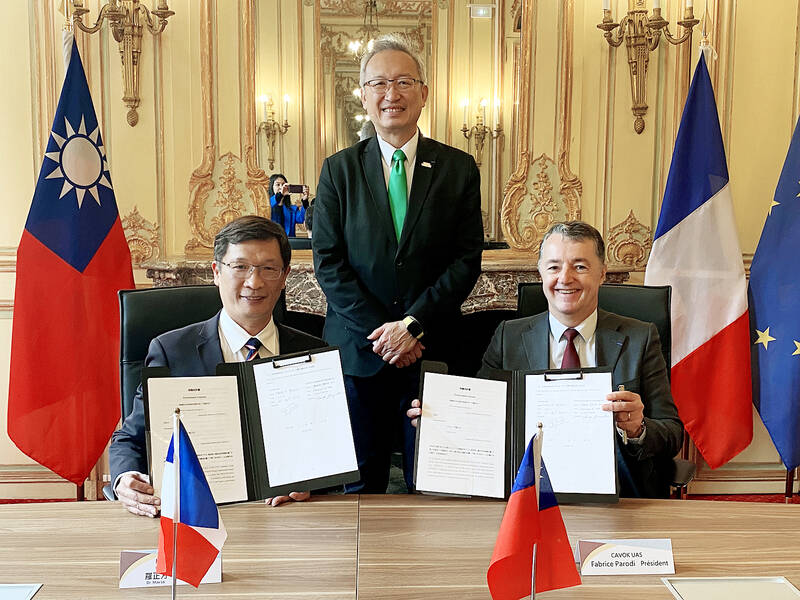Taiwan’s Geosat Aerospace & Technology Inc and France’s Cavok UAS have signed an agreement to develop “China-free” drones, which the companies said would meet the needs of customers in democratic countries.
During a signing ceremony at the Taipei Representative Office in France on Monday last week, Geosat said they plan to develop long-range drones capable of vertical takeoff and landing for military and commercial users.
The planned drone, codenamed CK50-T, would be capable of performing airborne and maritime intelligence, surveillance and reconnaissance missions, the firms said.

Photo: CNA
Cavok CEO Fabrice Parodi said he hopes the agreement would pave the way for further cooperation, as his company intends to build a production line in Taiwan and extend its reach in the Asia-Pacific region.
Production of the first drone under the partnership would be led by Cavok and take place in France with assistance from Geosat employees, Geosat chairman Lo Cheng-fang (羅正方) said.
The teams would obtain necessary certificates adopting international standards before introducing the drone to the global market, Lo said.
The teams would also meet in Taiwan to set up system integration and assembly for a subsequent drone, Lo said, adding that the plan is to mass produce the drones in Taiwan.
Taiwan is better than China for drone manufacturing thanks to its quality production capabilities, cross-industry business clusters and respect for intellectual property rights, Lo said.
Cavok wants to avoid becoming dependent on Chinese supply chains, Lo said, adding that more countries are exploring Taiwan as an alternative drone production center to Shenzhen, China.
Lo said that Taiwan is also better positioned as a drone manufacturing base than Southeast Asian countries, which offer cheaper labor, but trail behind in terms of maturity of chip and software engineering sectors.

Taiwan is to commence mass production of the Tien Kung (天弓, “Sky Bow”) III, IV and V missiles by the second quarter of this year if the legislature approves the government’s NT$1.25 trillion (US$39.78 billion) special defense budget, an official said yesterday. Commenting on condition of anonymity, a defense official with knowledge of the matter said that the advanced systems are expected to provide crucial capabilities against ballistic and cruise missiles for the proposed “T-Dome,” an advanced, multi-layered air defense network. The Tien Kung III is an air defense missile with a maximum interception altitude of 35km. The Tien Kung IV and V

The disruption of 941 flights in and out of Taiwan due to China’s large-scale military exercises was no accident, but rather the result of a “quasi-blockade” used to simulate creating the air and sea routes needed for an amphibious landing, a military expert said. The disruptions occurred on Tuesday and lasted about 10 hours as China conducted live-fire drills in the Taiwan Strait. The Civil Aviation Administration (CAA) said the exercises affected 857 international flights and 84 domestic flights, affecting more than 100,000 travelers. Su Tzu-yun (蘇紫雲), a research fellow at the government-sponsored Institute for National Defense and Security Research, said the air

Taiwan lacks effective and cost-efficient armaments to intercept rockets, making the planned “T-Dome” interception system necessary, two experts said on Tuesday. The concerns were raised after China’s military fired two waves of rockets during live-fire drills around Taiwan on Tuesday, part of two-day exercises code-named “Justice Mission 2025.” The first wave involved 17 rockets launched at 9am from Pingtan in China’s Fujian Province, according to Lieutenant General Hsieh Jih-sheng (謝日升) of the Office of the Deputy Chief of the General Staff for Intelligence at the Ministry of National Defense. Those rockets landed 70 nautical miles (129.6km) northeast of Keelung without flying over Taiwan,

A strong continental cold air mass is to bring pollutants to Taiwan from tomorrow, the Ministry of Environment said today, as it issued an “orange” air quality alert for most of the country. All of Taiwan except for Hualien and Taitung counties is to be under an “orange” air quality alert tomorrow, indicating air quality that is unhealthy for sensitive groups. In China, areas from Shandong to Shanghai have been enveloped in haze since Saturday, the ministry said in a news release. Yesterday, hourly concentrations of PM2.5 in these areas ranged from 65 to 160 micrograms per cubic meter (mg/m³), and pollutants were